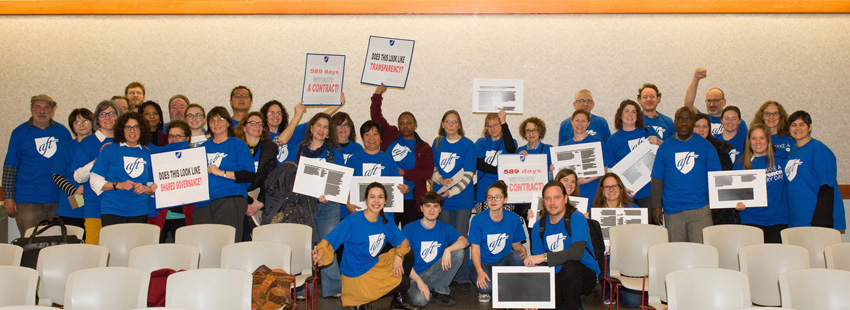
1435 Morris Avenue - Suite 3A, Union, NJ 07083
Tim Haresign, President
Ramapo Local Pushes Back Against College Redactions in Secretive "Efficiency" Report
Members of the Ramapo Federation of State College Teachers showed up in droves wearing their blue AFT T-shirts to the State of the College Address delivered by President Peter Mercer on February 8, 2017. Members held signs reading “589 DAYS WITHOUT A CONTRACT” as well as enlarged pages of the controversial consultants document called the Grant Thornton Report.
In his welcome back email to the campus community in September 2016, President Mercer announced his intention to negotiate the transition of some professional staff positions from 12 to 10 months. This announcement resulted in an outpouring of support for professional staff and a request to obtain the Grant Thornton Report, the document used as justification for “efficiency measures.”
When the Unions received the report, the 167 page document was completely redacted. It was these pages that AFT members held aloft along with signs reading, “DOES THIS LOOK LIKE TRANSPARENCY?” and “DOES THIS LOOK LIKE SHARED GOVERNANCE?”
AFT member Todd Barnes questioned President Mercer regarding the redaction, “Do you think the ‘translucency’ (i.e. Mercer expressed a preference for translucency over transparency in a previous question) practiced by the administration, the desire to keep the faculty and staff in the dark about the future of our institution, is a good example of shared governance?” Mercer stated he needed to refute “the notion that I favor translucency over transparency…The question is what is best to practice or what I am required to do as president under certain circumstances” adding that “I no more would expect to learn what you’re planning and discussions are for this meeting than you should learn everything that is in the Grant Thornton Report…There are some things that are my responsibility and some things that are yours. I for example do not presume to intrude on the curriculum of the college. I made it absolutely clear that the curriculum is the responsibility of the faculty.”
When asked if a summary of the findings and recommendations of the report could be made available to the community Mercer responded, “If something is not permitted specifically, the changes of it being permitted more generally I think are relatively slim.”
AFT Member and grievance officer Maria Vail posed the question whether Mercer believes conveners should be compensated to which Mercer responded that he does not have an “informed opinion…but would be happy to discuss it.”
Regarding the possibility of becoming a sanctuary campus, Mercer emphasized the possible fiduciary implications stating the College’s endowment is “by no means sufficient” to offset the loss of federal fund. He added that “before the College will release personally identifiable information…a judicial order or a lawfully issued subpoena is required.”
AFT Member and Vice President of Adjunct Faculty Tim Judge remarked that he is “shocked and finds it insensitive that the College routinely asks its employees to donate part of their paychecks back to the college,” citing the lack of contract, no raises and rising health costs resulting in a reduction of take-home pay. He questioned, “Why should the faculty and staff donate our money when we are so under-appreciated by the College, and asked to support projects when we do not have all the information needed to make an informed decision?” Mercer responded that the “flip side…is the insensitivity that would result from not inviting them (faculty and staff) to participate if they so wished.” To the point of not having enough information about the projects which are the target of the donation requests Mercer stated, “It is not always the place of the president…to be transparent” adding “it is more helpful to talk about being translucent.” Mercer stated he is “ultimately accountable to the Board of Trustees” and that “if at any point, the faculty, the staff and the students feel that I am not doing my job appropriately, that’s where they should go to express their concerns.”
